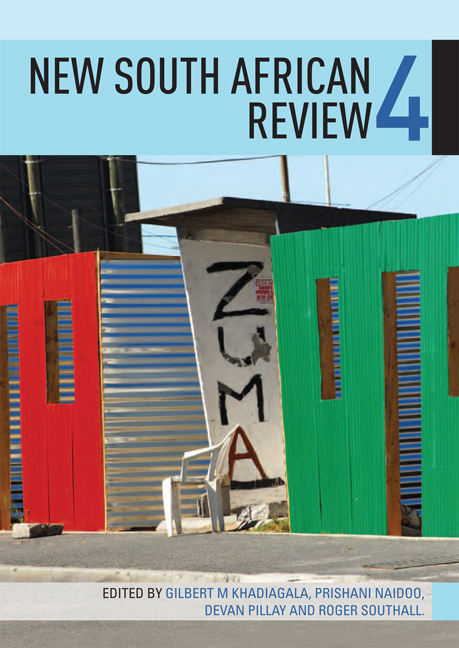Book contents
- Frontmatter
- Contents
- Preface
- Introduction: South Africa's fragile democracy: Twenty years on
- PART ONE ECOLOGY, ECONOMY AND LABOUR
- PART TWO POWER, POLITICS AND PARTICIPATION
- PART THREE PUBLIC POLICY AND SOCIAL PRACTICE
- Introduction
- Chapter 11 Why does Zimbabwe's school system out-perform South Africa's?
- Chapter 12 Higher Education in 2013: At many crossroads
- Chapter 13 Democracy without economic emancipation: Household relations and policy in South Africa
- Chapter 14 Prisons, the law and overcrowding
- PART FOUR SOUTH AFRICA AT LARGE
- Contributors
- Index
Introduction
from PART THREE - PUBLIC POLICY AND SOCIAL PRACTICE
Published online by Cambridge University Press: 21 April 2018
- Frontmatter
- Contents
- Preface
- Introduction: South Africa's fragile democracy: Twenty years on
- PART ONE ECOLOGY, ECONOMY AND LABOUR
- PART TWO POWER, POLITICS AND PARTICIPATION
- PART THREE PUBLIC POLICY AND SOCIAL PRACTICE
- Introduction
- Chapter 11 Why does Zimbabwe's school system out-perform South Africa's?
- Chapter 12 Higher Education in 2013: At many crossroads
- Chapter 13 Democracy without economic emancipation: Household relations and policy in South Africa
- Chapter 14 Prisons, the law and overcrowding
- PART FOUR SOUTH AFRICA AT LARGE
- Contributors
- Index
Summary
The founding provisions of the South African Constitution lay down that all citizens are equally entitled to the rights, privileges and benefits of citizenship (RSA 1996, Ch.1, 3.2). The Bill of Rights elaborates further. Everyone is equal before the law and has the right to equal protection and benefit of the law; equality includes the full and equal enjoyment of rights and privileges and freedoms; and everyone has inherent dignity and the right to have their dignity respected and protected. Numerous rights follow, such as the freedoms of religion, belief and opinion, expression, movement and residence, and the right to have access to adequate housing, health care, sufficient food and water and social security. Ultimately these rights are protected by the Constitutional Court – whose duty is to defend citizens’ rights against breach by government or any other body (such as large corporations) and, if convinced by appeals to its judgement, to order the government to implement policies to ensure that citizens’ rights are realised.
Understandably, the role played by the Constitutional Court, and the African National Congress (ANC) government's relationship to it, have come under intense scrutiny, internationally as much as domestically. Generally, it is fair to say that the performance of the Constitutional Court has received highly favourable reviews. However, as was discussed in the Introduction, Theunis Roux has argued that the role of the Constitutional Court is as much political as it is legal – that is, in seeking to defend and secure implementation of the Constitution, the Court has to be advised not merely of what is politically possible but what is politically wise. Although it may well be the duty of a Constitutional Court to stand up against an oppressive government, when push comes to shove the latter is usually more powerful – and if such a government chooses to ride roughshod over a constitution, there may be little that a Constitutional Court can do about it (except shout from the sidelines).
Roux fears that after two decades of democracy the ANC may be more predisposed than it was to undermine the independent standing and the status of the Constitutional Court. The implication is that a Manichean struggle between the judiciary and the executive might be pending, the outcome of which could prove to be critical for South African democracy.
- Type
- Chapter
- Information
- New South African Review , pp. 198 - 203Publisher: Wits University PressPrint publication year: 2014



